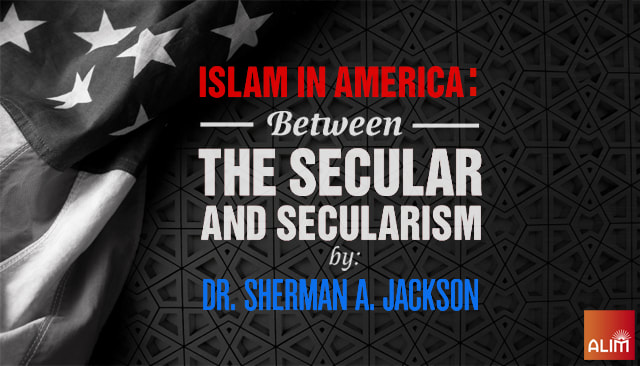|
A most insidious impediment to a dignified existence for Muslims in America is the basic misunderstanding of the truism that Islam and secularism are mutually exclusive. Inasmuch as America is a “secular democracy,” many non-Muslims insist that no religion that positions itself as the polar opposite of the secular should be allowed to play a meaningful role in determining the country’s direction. In fact, in their view, allowing Muslims to influence public debate risks undermining the country’s secular order. Meanwhile, many Muslims quietly share aspects of this perspective, even if for practical reasons they come to a different set of conclusions. They too see an inherent contradiction between Islam and the secular, as a result of which they view participation in American public life almost as a necessary evil, to be indulged only out of a sense of duress, sort of like eating swine to ward off starvation. But is Islam really inherently opposed to the secular? Or is it secularism with which Islam has a problem? In and of itself, “secular” simply means “this worldly.” And the secular realm is simply that realm where this-worldly logic is invoked as opposed to any strict reliance on scripture or religion. In other words, it is considerations of “efficiency,” “order,” “fairness,” “safety,” and the like that determine the proper course of action, not any explicit directive based on, “God said” or “His Messenger said.” Secularism, on the other hand, is the ideological commitment to the idea that only this-worldly logic should govern every aspect of our lives. On this understanding, many Americans believe that “separation between church and state” requires that all religious considerations be banned from exerting any influence on public policy and debate.
For its part, not only has Islam always accommodated secular considerations, it has fundamentally relied on them in many of its deliberations. For example, while the Qur’ân and Sunna obligate men to provide adequate housing for their spouses, scripture was not invoked to determine what an adequate house was. Just because houses in the time of the Prophet* did not have electricity or indoor toilets, this did not mean that such dwellings would forever fulfill the meaning of “adequate house.” Rather, “adequate housing” would be determined by such “this-worldly” or secular considerations as the prevailing norm in particular societies in particular places and times. And of course, as circumstances evolved, so too would the concrete meaning of “adequate house.” This is just a single example from a single corner of the law. As a whole, Islamic law is absolutely replete with such secular considerations. Part of the point in all of this is that secular logic, i.e., the logic by which we might determine “adequate housing,” or a “safe speed limit,” or an “efficient means of ensuring medical competence in doctors” is foreign neither to Islam nor Muslims. And as so many aspects of our most pressing societal issues today (gun control, health-care, the economy, social security, FAA, FDA and DMV regulations) revolve precisely around secular logic (safety, efficiency, order and the like) there is no reason for Muslims to feel like they are somehow betraying Islam or succumbing to some alien logic by engaging these issues and insisting on having their voices heard. Nor, conversely, is there any justification for the non-Muslim presumption that the only logic Muslims possess is an explicitly ‘religious’ logic that is closed to all outsiders, by virtue of which the American secular order can only be compromised, if not destroyed, by the inclusion of Muslim voices. Of course, it goes without saying that not everything in Islam is or can be negotiated through a secular logic. Indeed, Islam includes transcendent values and meanings that carry a fundamental presumption of non-negotiability. Adultery and theft, for example, are moral evils and constitute crimes; and no amount of secular or any other logic is likely to change that. Here, in fact, is where Islam’s problem with secularism begins. But, it is surely a mistake to say that because some – indeed many — of Islam’s values and meanings are transcendent and non-negotiable that everything a Muslim espouses must be espoused as transcendent, unchanging, non-negotiable truth. For there is nothing transcendent, non-negotiable or necessarily “Islamic” — or “un-Islamic” for that matter — about seeing the optimal speed limit as 80 mph or advocating a single-payer health care system or no government health care system at all. On the other hand, “transcendent” does not necessarily mean “impervious to secular logic”; it simply implies the possibility of defying the latter. After all, one can think of all kinds of secular reasons to ban adultery or theft. And here we might remind those who think that religious values in and of themselves simply have no place in American secular democracy that it is only religion as its own closed, transcendent logic that the secular American state may not impose as law or policy, not religion articulated through a logic that finds wide acceptance in society at large. And God knows best. Email your comments and questions to [email protected].
0 Comments
Leave a Reply. |
|
stay connected
@alimprogram
PO Box 871785 Canton, MI 48187
(734) 956-0698
(734) 956-0698
2024 © American Learning Institute for Muslims. All rights reserved.
ALIM is a 501(c)(3) organization. All donations are zakat-eligible and tax deductible. Our EIN is 38-3633579.
Zelle: [email protected]
Terms of Service | Privacy Guidelines | Sign Up for ALIM Emails I Get ALIM Text Alerts
ALIM is a 501(c)(3) organization. All donations are zakat-eligible and tax deductible. Our EIN is 38-3633579.
Zelle: [email protected]
Terms of Service | Privacy Guidelines | Sign Up for ALIM Emails I Get ALIM Text Alerts


 RSS Feed
RSS Feed